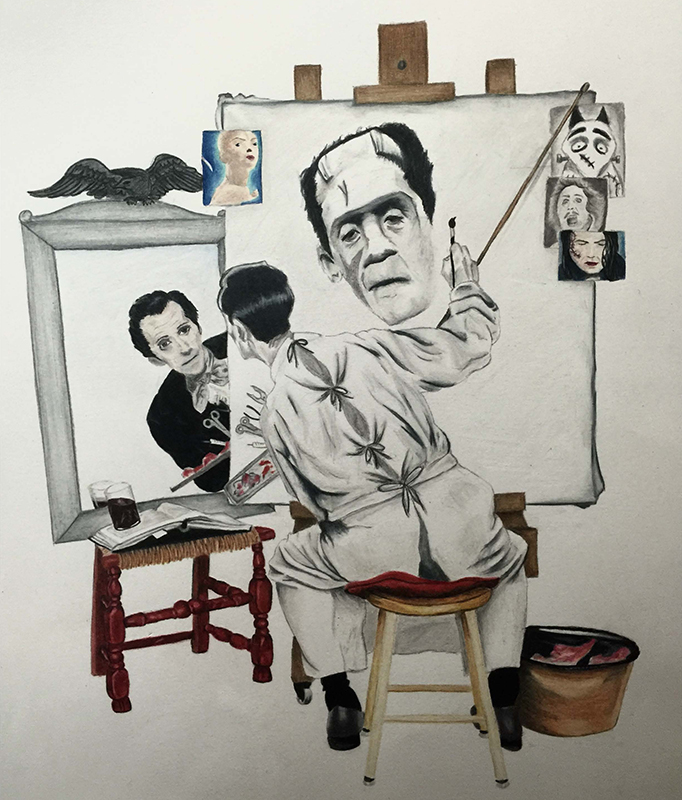FAYETTEVILLE, Ark. – University of Arkansas professors Sean Connors and Lissette Lopez Szwydky-Davis have been awarded a $160,000 grant from the National Endowment for the Humanities to co-direct a two-week summer institute for K-12 educators from Arkansas and across the U.S.
The institute will be hosted at the U of A from June 14-27 and all K-12 educators across the country are invited to apply to this interdisciplinary program.
The institute, “Remaking Monsters and Heroines: Adapting Classic Literature for Contemporary Audiences,” will use adaptations of Frankenstein and Cinderella as case studies to promote innovative uses of multimodal adaptations in the classroom.
All teaching disciplines and areas of focus are welcome, including language arts, world languages, social studies, science, technology, mathematics, art, music and media specialists.
The institute is a central part of ongoing interdisciplinary collaborations between Connors and Szwydky-Davis, representing the U of A’s College of Education and Health Professions and the J. William Fulbright College of Arts and Sciences, respectively.
This is the pair’s second time to receive this nationally competitive award and will be their second time running this summer institute, which first debuted in June 2018. In addition to funding from the National Endowment for the Humanities, the program is being supported by the U of A’s newly launched Arkansas Humanities Center.
The 2020 institute invites K-12 teachers to learn more about the historical and literary origins of Frankenstein and Cinderella and to study adaptations of these stories in film, drama, music, young adult fiction, illustrated children’s books and graphic novels.
|
|
“As participants work through the multimedia cultural histories of each tale during the two-week institute, they will design teaching materials for the purpose of facilitating student-produced literary adaptations of their own,” said Szwydky-Davis, whose areas of expertise include 19th-century literature and culture, adaptation studies, the gothic tradition, and gender studies.
“The act of breaking down a text and recreating it in a new form is an act of critical engagement that demonstrates a sophisticated understanding of the source material,” she said. “Adaptation is a practice central to the history, circulation, and evolution of storytelling, literature and art.”
Connors said that the teachers who attend this summer’s institute will create their adaptations using a range of digital tools.
“Digital technologies are changing how people communicate. As a result, it’s important that teachers create opportunities for students to think about how texts they consume and produce use not just print, but also images, video, sound and so on to make meaning,” said Connors, who specializes in young adult literature, graphic novels, multimodal literacies and digital storytelling.
Connors said institute participants will also learn from several multimedia storytelling, arts integration and adaptation experts and artists. Such experts include Thomas Leitch, professor of English and director of the film studies program at the University of Delaware, and Lita Judge, an award-winning visual artist specializing in books for children and young adults. Program participants will read Judge’s award-winning book Mary’s Monster: Love, Madness, and How Mary Shelley Created Frankenstein.
This summer institute will include trips to and collaboration with local arts and humanities attractions, including TheatreSquared, the Fayetteville Public Library, and the Crystal Bridges Museum of American Art.
Applications will be accepted until Sunday, March 1, and 30 Summer Scholars will be selected and invited to attend the institute by late March. All Summer Scholars selected to participate in the institute will receive a $2,100 stipend to offset travel, housing and related expenses for the two-week program.
For more information or to apply, visit monstersandheroines.uark.edu.
About the University of Arkansas: The University of Arkansas provides an internationally competitive education for undergraduate and graduate students in more than 200 academic programs. The university contributes new knowledge, economic development, basic and applied research, and creative activity while also providing service to academic and professional disciplines. The Carnegie Foundation classifies the University of Arkansas among fewer than 3% of colleges and universities in America that have the highest level of research activity. U.S. News & World Report ranks the University of Arkansas among its top American public research universities. Founded in 1871, the University of Arkansas comprises 10 colleges and schools and maintains a low student-to-faculty ratio that promotes personal attention and close mentoring.
Topics
Contacts
Shannon G. Magsam, director of communications
College of Education and Health Professions
479-575-3138, magsam@uark.edu
Andra Parrish Liwag, development writer
Fulbright College of Arts and Sciences
479-575-4393,
liwag@uark.edu

 Skye Farrell’s “Monster Within the Man,” created in 2016.
Skye Farrell’s “Monster Within the Man,” created in 2016.